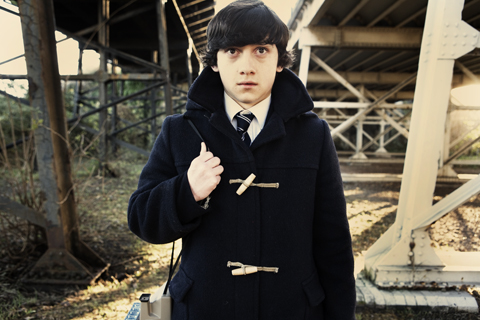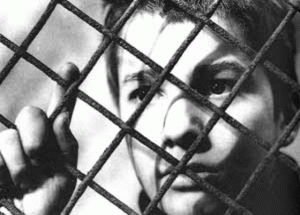Film Review: A Sleek and Smart “Submarine”
Submarine director Richard Ayoade has good taste. He loves movies so purely and energetically that it’s fun to watch him borrow from his favorites and patch together something new.
Submarine. Directed by Richard Ayoade.
By Taylor Adams
Ah, young love . . . especially under the spell of film studies and indie rock. British director Richard Ayoade’s debut feature Submarine is funny, adorable, smart, and ultimately refreshing—though it owes a debt to plenty of the right influences.
This product of mash-up culture laces its tale of a bumbled first romance with Jean-Luc Godard-esque intertitles, occasional New Wave editing rhythms, and a healthy sprinkling of other film references. Godard himself famously said that all you needed to make a film was a gun and a girl. All Ayoade needs is the girl, a hilariously awkward young suitor, and a lot of other movies.
We’re introduced to 15-year-old Oliver Tate (Craig Roberts) via a series of monologue montages in which he expresses his proto-bohemian foibles (a hat phase, pipe-smoking phase, Serge Gainsbourg phase, et al) and desires (elaborate strategies to get laid before his 16th birthday, creepy surveillance in hopes of saving his parents’ marriage, etc). The story proper starts when he describes his attraction for schoolmate Jordana (Yasmin Paige), a target chosen not the least because she was recently cheated on and is thus “available.”
The film’s most entertaining quips arrive courtesy of the voice-overs. They might feel like a writing crutch (Ayoade adapted the screenplay from a novel by Joe Dunthorne) if they weren’t so consistently witty and charming. The director is known, mostly across the pond, for his television acting in The IT Crowd and occasional contributions to The Mighty Boosh. The ironic cringe-humor of those shows works its way into his feature debut on occasion, such as when Tate’s marine biologist father describes the “atavistic” response once inspired by ripping his vest off in front of a woman.
As they say, the apple doesn’t fall far from the tree, and thus the dictionary humor continues along with Oliver’s story. This is a kid who asks his new-found lady friend to read Shakespeare, Nietzsche, and The Catcher in the Rye in hopes they’ll develop shared interests, and whose idea of classy seduction involves box wine and striking a pose on his parents’ bed by candlelight. “You know you’re a serial killer?” says a beleaguered Jordana. The awkwardness is palpable—but charming.
Jordana, for her part, has a bit of a youthfully innocent, nihilistic streak. One of the couple’s favorite romantic activities is singeing Oliver’s leg hair with matches. They like to hang out in scrapyards and other areas of industrial decay—playing with fireworks in cute musical montages accompanied by superb, original songs by Brit indie-rock hero and Arctic Monkeys frontman Alex Turner.
But nothing perfect ever lasts. Hence, when it turns out these forays aren’t simply Jordana’s idea of adolescent rebellion but angst stemming from her mother’s serious illness, Oliver screws things up. The movie takes a somewhat sobering turn for the serious as he tries to win her back. He also grapples with his parent’s growing estrangement and his mother’s attachment to an old flame, Graham Purvis (Paddy Considine), who also happens to be a prism-wielding, mullet-sporting, new-age psychic type.
The film quickly sinks into a sort of post-modern ennui: Oliver’s persistent feeling of slipping into an engulfing submersion lends the film its title. There’s a great effort made to humorously explore both the highs and the lows of adolescent experience (and beyond), but it probably sounds a bit muddled and it is. Ayoade’s beat and instinct suffer a little when working in a minor key. The humor gets decidedly more masochistic, and scenes where Oliver vengefully sets Purvis’s bed aflame and runs into considerable trouble attempting to urinate on the mystic’s stock of self-help videos are a little heavier on the cringe than they are on the humor.
Still Submarine is a quirky, enjoyably realized tale. It’s also a heavily stylized one, where the director’s tastes and preoccupations have an obvious and positive effect on the film. Tate is the kind of movie protagonist who informs the audience that he often wishes a film crew would document his every move. Or who, in a pre-opening credits title card, thanks American audiences for not yet invading Wales and declares his film “an important one.” Such winking acts of self-consciousness accentuate the fact that cinephile Oliver is often a stand-in for cinephile director Ayoade. And then, there are the film references.
Many have been quick to draw comparisons between the movie and Wes Anderson’s sophomore effort Rushmore. Parts of the premise, the “crafted” visual style, and several characters, especially Oliver, are an obvious nod, but it has led to the film being marketed as some kind of neo-Anderson twee extravaganza.
These are two different filmmakers— Anderson has become more interested in building his worlds on-screen (for example, his latest effort, the excellent, painstakingly constructed, stop-motion adaptation Fantastic Mr. Fox) while Ayoade’s style instead frenetically dazzles the viewer with the on-screen personalities. And while Submarine can’t make many claims in the way of uniqueness, it does unequivocally possess the beating heart of a film lover as its core.
Ayoade is a guy who really loves movies . . . and wants you to know about it. In under 100 minutes we have at least two references to the end of The 400 Blows, a date night at a screening of The Passion of Joan of Arc, wardrobe nods to Harold and Maude, several scenes shot on Super 8 film, and a poster of Alain Delon staring down suavely from our protagonist’s wall. There are many others, of course, a number would be missed on a first viewing.
Winks and nods like this can sometimes seem like filler at worse and, if not, then at least pretentious asides for the benefit of a small, art house in-crowd. Here, it’s no problem. Nothing’s been thrown in without thought. The image of Truffaut’s Antoine Doinel running along a beach in The 400 Blows was powerful for a reason. And though less so here, the infusion of DNA is such that referencing the scene with Oliver’s own desperate jog would work whether you recognized the homage or not. And that’s just how it should be.
In other words, Ayoade has good taste. He loves movies so purely and energetically that it’s fun to watch him borrow from his favorites and patch together something new—which, despite a film-studies textbook full of cinematic micro-loans, Submarine most certainly is.



